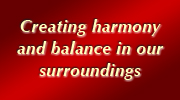|
|

|

|

|

|

|

|

|

|
|
|
||
|
|
||
|
|
|
Land and Siting a House by Carol C. Wheelock
Dear Carol, Dear Alan and Betsy, The first thing to look for is the health of the land. Can the soil be crumbled in your hand? Or is it too fine or does it contain too much clay? The Chinese have a very detailed system of examining the soil that includes most of the senses. There needs to be vegetation. Are the plants healthy looking? Look up at the trees to be sure they do not have a lot of dying branches. If you are unsure of the health of the trees, there are many free resources available through the state to help you. Are there signs of wildlife? Can you hear birds? Healthy vegetation will support healthy wildlife. Even it is a small piece of property, it should have its share of birds and butterflies. If there is water on the property, check for clarity. Be sure that ponds have a fresh source of water flowing through them. Is moving water flowing in a meandering manner -- not too straight and fast or too sluggishly? Check to be sure there are not pools of stagnant water. Land that is moderate in contour is favored. A gentle slope is ideal, with the slope descending toward the road or point of access to the property. You also want to be above any water, safe from any flood plain. Avoid extremes such as land that has very steep slopes or cliffs, especially for building sites. Land that is below the level of the road is not considered good feng shui. Looking out the window on a daily basis at a hill can be daunting. Every time you leave the house it would feel like an uphill struggle. Property that is right next to a busy highway is also not a good choice. Aside from the noise factor, there is the fast moving energy. It's the same as living next to a fast-moving river. Life starts to feel as though it moving too quickly -- and that's already a big problem for many. There is also the belief that it can affect the coming and going of money. As with all of feng shui, these are guidelines. There are usually "cures" that can be implemented to help minimize the effects of some less desirable qualities of the land. Energy work can also be done to improve the land's chi or energy.
Dear Carol, Dear Kelly, There are several major schools of feng shui. The form school advocates siting a house so that it is protected in back and open in front. This is called the command position. This means that the front door placement is dependent on the features of the land. The compass school, of which there are several differing branches, uses astrological and mathematical formulas to determine "best" directions for a variety of rooms and pieces of furniture. Despite what you may have read, the front door placement is not one of these. Your front door should be easily seen as you approach your house. Sometimes houses are put on sites so that you see the back of the house and not the front door, or any door, as you approach. They have often been sited this way to take advantage of a view. A better choice would be to choose a different house design so that the front and the view can be on the same side. The bottom line is that "form overrides compass," which means that it is more important to be in harmony with the land than to face a specific direction. It is more about feeling safe and comfortable. That's what being in harmony with your surroundings is all about.
Dear Readers, Red is very significant during the new year celebration. Its use goes back to a legend in which a man-eating beast was chased off by the color red. It has come to symbolize the color that can chase away bad luck and evil. Red is also associated with the fire element, which supports strength, success, and passion. The Chinese also use red to attract and support prosperity. 2007 is the year of the Pig or Boar. Those born in a Pig/Boar Year (1995, 1983, 1971, 1959, 1947, etc. -- every twelve years) are said to be very loyal and often keep friends for life. Considered chivalrous by many, they have excellent manners. They are often optimistic and intellectually curious, making them very idealistic. They also tend to be extravagant . What does this mean for us? For one, I believe that a celebration that lasts 15 days causes us to contemplate what it is all about more than our typical one night celebration. Secondly the Chinese New Year is based on the lunar calendar, a calendar that more closely connects us with our natural world. Also the Chinese zodiac system is based on 12-year cycles, the year of the Pig/Boar representing strong and active energy. Honoring the fact that there are rhythms and cycles of life is another way that we can become more in sync with our universe. And that is what feng shui is all about.
Wishing you happiness and prosperity. Gung hei fat choi!
Carol C. Wheelock |
|
|
|
||

|
||

|